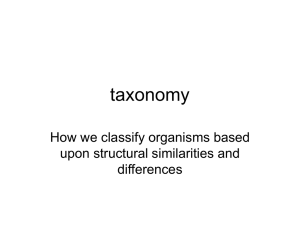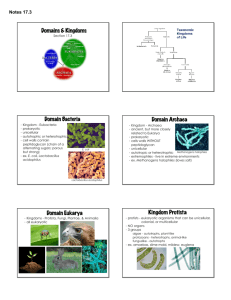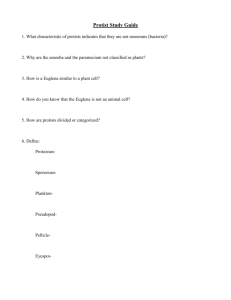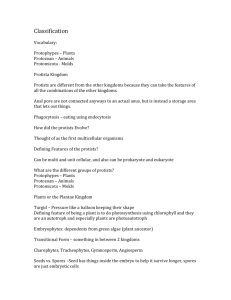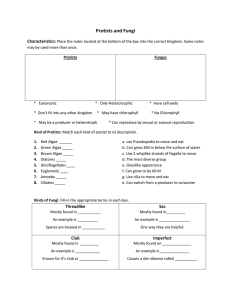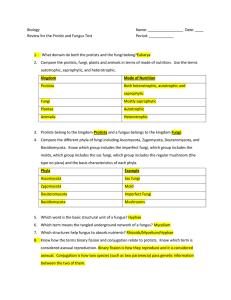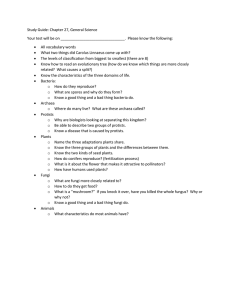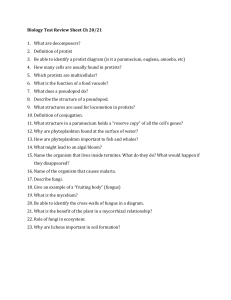Unity and Diversity of Living Things Teaching
advertisement
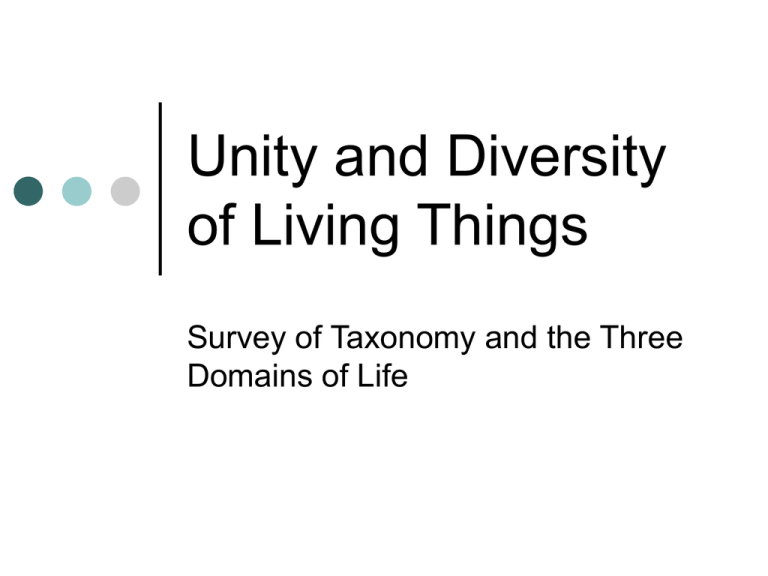
Unity and Diversity of Living Things Survey of Taxonomy and the Three Domains of Life SYSTEMATICS Systematics - science of naming and grouping organisms by their evolutionary relationships Binomial nomenclature - assigning scientific names Each species is assigned a two-part scientific name, usually in Latin, written in italics or underlined (if handwritten) First word (genus name) is capitalized, the second word (species name) is not Ex: polar bear = Urus maritimus Ex: red maple = Acer rubrum Ex: human = Homo sapiens Fun Species Names Aha ha Fun Species Names Abra cadabra Fun Species Names Gelae baen, Gelae belae, Gelae donut, Gelae fish Fun Species Names Heerz lukenatcha Fun Species Names Pieza kake fly Fun Species Names (Agathidium bushi, A. cheneyi, A. rumsfeldi) Fun Species Names Agra vation Fun Species Names Caloplaca obamae Fun Species Names Agathidium vaderi Fun Species Names Aptostichus stephencolberti Fun Species Names Agra katewinsletae Fun Species Names Sylvilagus palustris hefneri Fun Species Names Pheidole harrisonfordi Fun Species Names GoldenPalace.com monkey (Callicebus aureipalatii) LEVELS OF CLASSIFICATION Domain (most inclusive) Kingdom Phylum Class Order Family Genus Species (least inclusive) LEVELS OF CLASSIFICATION Keep Pots Clean Or Family Gets Sick Classification of Humans Classification Rap http://www.youtube.com/watch?v=6jA GOibTMuU DOMAINS OF LIFE 3 Domains of Life Archaea (prokaryotic) Bacteria (prokaryotic) Eukarya (eukaryotic) PHYLOGENETIC TREE DOMAIN BACTERIA Prokaryotic Unicellular Cell walls contain peptidoglycan Ecologically diverse ranging from free-living soil organisms to deadly parasites Some autotrophic, some heterotrophic Some need oxygen to survive (aerobic), some are killed by oxygen (anaerobic) Only one kingdom within this domain: Kingdom Eubacteria DOMAIN ARCHAEA Prokaryotic Unicellular Cell walls do NOT contain peptidoglycan Live in very harsh environments Some autotrophic, some heterotrophic Some need oxygen to survive (aerobic), some are killed by oxygen (anaerobic) Only one kingdom within this domain: Kingdom Archaebacteria IMPORTANCE OF PROKARYOTES 1) Ecological Importance: Essential in maintaining every aspect of the ecological balance of the living world Decomposers – recycling raw materials to the environment, essential to sewage treatment & production of purified water Producers – cyanobacteria are among the most plentiful photosynthetic organisms in the world & many food chains are dependent upon them Nitrogen Fixers – converting nitrogen gas into useable forms IMPORTANCE OF PROKARYOTES 2) Human Uses Food – yogurt, other dairy products Medicine – making drugs for medical treatments IMPORTANCE OF PROKARYOTES 3) Disease – some bacteria can cause disease by destroying living cells or by releasing chemicals that upset homeostasis Ex: Lyme disease, Tetanus, Tuberculosis, Strep Throat Controlled by sterilization, disinfectants Prevented by vaccines DOMAIN EUKARYA All eukaryotes contain a nucleus & other membrane-bound organelles Four kingdoms: Protista Fungi Plantae Animalia EUKARYA - PROTISTS Unicellular, colonial, or multicellular Photosynthetic or heterotrophic “Catch-all” kingdom – group of eukaryotes that did not fit into plants, animal, or fungus kingdom ECOLOGICAL IMPORTANCE OF PROTISTS Autotrophic Protists – photosynthetic protists at the base of the food chain makes much of the diversity of aquatic life possible Ex: Algae Heterotrophic Protists – some heterotrophic protists engulf and digest their food, while others live by absorbing molecules from the environment. Ex: Paramecium, amoeba Symbiotic Protists Mutualistic – algae help health of coral reefs, Trichonympha live in guts of termites, helping them to digest cellulose Parasitic – can cause intestinal disease, African Sleeping Sickness, & Malaria EUKARYA - FUNGI Heterotrophic – feed on dead or decaying organic matter Secrete digestive enzymes into their food source, then absorb nutrients though their cell walls Cell walls made of chitin Unicellular (yeasts) or multicellular (mushrooms) ECOLOGICAL IMPORTANCE OF FUNGI Decomposers – many species of fungi help ecosystems maintain homeostasis by breaking down dead organisms and recycling essential elements and nutrients Parasites – parasitic fungi can cause serious diseases in plants and animals Ex: smuts and rusts in plants Athlete’s foot & ringworm ECOLOGICAL IMPORTANCE OF FUNGI Symbiotic Fungi: Lichens – mutualistic association between a fungus and a photosynthetic partner (algae or cyanobacteria) • Are often the first organisms to enter barren environments and help in early stages of soil formation Michorrhizae – mutualistic association between a fungus and a plant root • Estimates that 80-90% of all plant species have this sort of relationship • Fungus collects water and minerals, bringing them to the root, plant supplies the fungi with the products of photosynthesis (sugars) EUKARYA - PLANTS Multicellular Cell walls with cellulose Autotrophic Have chloroplasts EUKARYA - ANIMALS Multicellular Heterotrophic No cell walls Most can move

